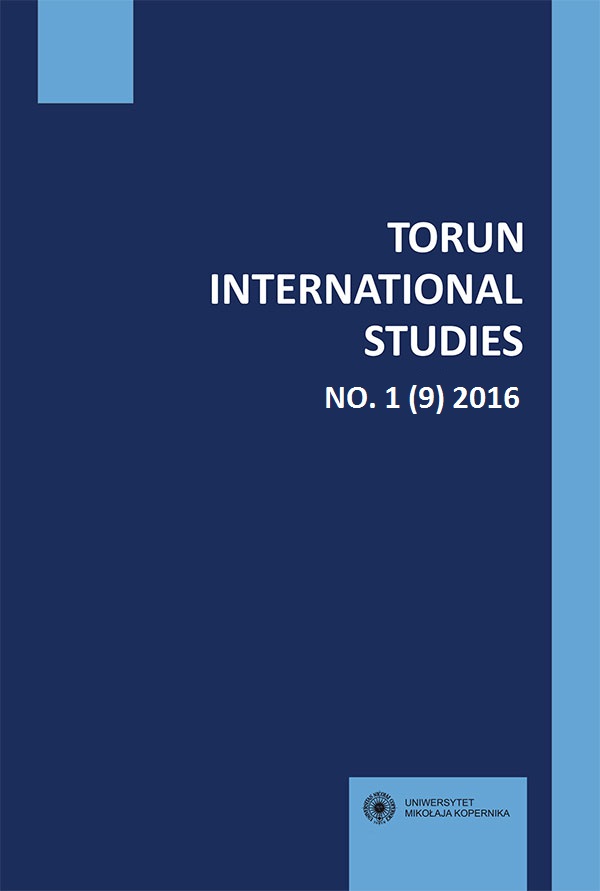SUSTAINING GOVERNMENT BUDGET DEFICITS AS A CAUSE FOR THE COST OF PUBLIC DEBT SERVICE INCREASE IN WESTERN EUROPEAN COUNTRIES IN THE 1995-2015 PERIOD
DOI:
https://doi.org/10.12775/TIS.2016.005Keywords
public finance, general government deficit, public debt, cost of public debt service, government bond yieldsAbstract
More and more results of econometric modeling research are showing the relationship between the value of general government deficit and the costs of public debt service. The correlation analysis conducted for the purposes of this work confirms strong negative dependence between the average general government balance (in relation to GDP) and the average yield of 10-year treasury bonds in 15 Western countries within the EU in the 1995–2015 period (sustaining higher deficits of general government are accompanied with higher costs of public debt service over a long period of time). Pearson’s correlation coefficient for the entire research period amounted to –0,78. This dependence increased after the breakout of the financial crisis – within the 2008–2015 period, Pearson’s r = –0,71, whereas during the 1995–2007 period, it was –0,63, which is consistent with the research results pointing out that the condition of public finances affects the decisions of investors in crises greater than in the relatively calm periods.References
Alexopoulou I., Bunda I., Fernando A., Determinants of government bond spreads in new EU countries, “ECB Working Paper”, September 2009, No. 1093.
Ardagna S., Caselli F., Lane T., Fiscal discipline and the cost of public debt service: Some estimates for OECD Countries, “NBER Working Paper”, September 2004, No. 10788.
Baldacci E., Gupta S., Mati A., Is it (Still) Mostly Fiscal? Determinants of Sovereign Spreads in Emerging Markets, “IMF Working Paper”, November 2008, No. 259.
Beirne J. Fratzscher M., The Pricing of Sovereign Risk and Contagion during the European Sovereign Debt Crisis, “ECB Working Paper”, 2012, No 1480.
Bernoth K., von Hagen J., Schuknecht L., Sovereign risk premia in the European government bond market, “ECB Working Paper”, 2004, No. 369.
Bernoth K., Wolff G.B., Fool the markets? Creative accounting, fiscal transparency and sovereign risk premia, “CESifo Working Paper”, May 2006, No. 1732.
Canzoneri M.B., Cumba R., Diba B., Should the European Central Bank and the Federal Reserve be concerned about fiscal policy?, Rethinking stabilization policy: a symposium sponsored by the Federal Reserve Bank of Kansas City, Jackson Hole, Wyoming, August 29–31, 2002, pp. 333–389.
Caselli F., Giovannini A., Lane T., Fiscal discipline and the cost of public debt service: Estimates for OECD countries, “IMF Working Paper”, April 1998, No. 55.
Cieślik E., Jankowska E., Górniewicz G., Piotrowicz A., Redo J., Redo M., Siemiątkowski P. (2015), Ekonomiczne aspekty integracji wybranych państw Europy Środkowo-Wschodniej, Wydawnictwo Naukowe Uniwersytetu Mikołaja Kopernika, Toruń, DOI: 10.12775/ TIS.2015.100, pp. 123–162.
Dumičić M., Ridzak T., Determinants of sovereign risk premia for European emerging markets, “Financial Theory and Practice”, 2011, 35 (3), pp. 277–299.
Eurostat (2016a), EMU convergence criterion bond yields – annual data, 1995–2015 (extracted on 2016.12.13).
Eurostat (2016b), Government deficit/surplus. Percentage of gross domestic product (GDP), 1995–2015 (extracted on 2016.12.13).
Faini R., Fiscal policy and interest rates in Europe, “Economic Policy”, 2006, No. 21 (47), pp. 443–489.
GUS, Kwartalne wskaźniki makroekonomiczne, data until 3rd quarter of 2016 (extracted on 2016.12.06).
Heinz F.F., Sun Y., Sovereign CDS spreads in Europe – The role of global risk aversion, economic fundamentals, liquidity, and spillovers, “IMF Working Paper”, January 2014, No. 17.
International Monetary Fund, Global Financial Stability Report – A new look at the role of sovereign credit default swaps, April 2013, pp. 57–92.
Izák V., Public debt service, interest rates and fiscal variables in transition countries, “Prague Economic Papers”, 2004, No. 1, pp. 3–15, DOI: 10.18267/j.pep.227.
Laubach T., New evidence on the interest rate effects of budget deficits and debt, “Journal of the European Economic Association”, 2009, No. 7 (6), pp. 858–885.
Moser C., The impact of political risk on sovereign bond spreads. Evidence from Latin America, Proceedings of the German Development Economics Conference, Verein für Socialpolitik, Research Committee Development Economics, Göttingen, November 2007, No. 24.
Redo M., Cieślik E., Jankowska E., Górniewicz G., Piotrowicz A., Redo J., Siemiątkowski P. (2015a), Ekonomiczne aspekty integracji wybranych państw Europy Środkowo-Wschodniej, Wydawnictwo Naukowe Uniwersytetu Mikołaja Kopernika, Toruń, DOI: 10.12775/ TIS.2015.100, pp. 123–162.
Redo M. (2015b), An analysis of economic changes in the countries of Central and Eastern Europe belonging to the European Union in the years 2003–2014, Torun International Studies, Vol. 1, No. 8, pp. 83–97, DOI: http://dx.doi.org/10.12775/TIS.2015.008.
Redo M. (2016), Bezpieczeństwo finansów publicznych – wpływ ekspansji fiskalnej na koszty obsługi długu publicznego w Polsce na tle krajów Europy Środkowo-Wschodniej (forthcoming).
Redo M. (2017), Trwała redukcja wydatków publicznych sposobem na niekeynesowskie przyśpieszenie wzrostu gospodarczego w Polsce (forthcoming).
Zugravu B.G., Dobranschi M., Public debt service and its impact on public expenditures, Banking, Accounting and Financial Systems from the 21st Century Perspective, “Revista Economică”, 2012, No. 4, pp. 655–664.
Downloads
Published
How to Cite
Issue
Section
Stats
Number of views and downloads: 290
Number of citations: 0



